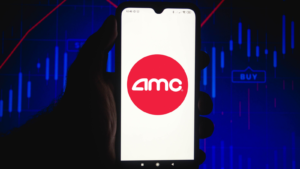
As companies boast robust earnings, pioneer breakthrough technologies and cement a loyal customer base, excitement over their future potential skyrockets. However, as they evolve — sometimes for the worse — businesses become obvious stocks to sell.
On the brighter side, the U.S. equity market has shown promise this year, with the Nasdaq index rebounding by about 35% during the first half. Much of this stellar performance can be attributed to breakthroughs in generative AI. Nevertheless, the shadow of inflation still looms despite the concerns fading away of late. That unsettled climate is most tangible among businesses targeting consumer end-markets. As consumers grow wary, the tightening of purse strings is evident, so investors must make astute decisions.
AMC Entertainment (AMC)

In the tumultuous stock market, leading movie theatre chain AMC Entertainment (NYSE:AMC), continues to falter. Though the second quarter brought a 15.6% bump in revenues year-over-year (YoY) and a noteworthy net income of $8.1 million, it wasn’t all roses. The company’s operating endeavors burned a concerning $13.4 million in cash. Alarmingly, when set against a meager liquidity of $643 million, AMC’s debt looms large over $9 billion.
Moreover, while AMC sold its shares of its preferred equity units to tackle its mounting debt, converting these to common shares risks significant shareholder dilution. Furthermore, a staggering 78% dip in AMC’s stock in the past 30 days is indicative of those growing concerns. Profitability rates remain firmly in the red for AMC, with a negative net income margin of 17.4%. Moreover, its EBIT margin stands at a negative 5.33%.
Southwest Airlines (LUV)
In the golden era of aviation, Southwest Airlines (NYSE: LUV) stands tall as a paragon of cost-efficiency. However, recent headwinds saw this industry stalwart taking a massive beating. Moreover, its stock has shed over 8% of its value year-to-date (YTD), rendering it a diminutive player compared to towering peers. Additionally, a surge in labor and material expenses has amplified this downturn, sidelining the typical issues surrounding customer demand.
Furthermore, Southwest’s second-quarter results brought further gloom. An immediate drop of 9% in its share price followed the announcement — a reaction to declining sales and earnings of $1.09, which fell short of analyst expectations by one cent. As the company navigates this rough patch, stakeholders must wonder if market adversities will buffet Southwest. Moreover, it revised its forecast for the current quarter with the airliner expecting third-quarter sales per available seat mile to decline between 5% and 7%, compared to its earlier prediction of a drop between 3% and 7%.
Target (TGT)

Amid the turbulent retail landscape, retail juggernaut Target (NYSE: TGT), known for its vast product assortment ranging from home goods to apparel, is navigating choppy waters. The backlash from the “anti-woke” sentiment, reflecting resistance to progressive cultural movements, appears to have taken its toll, causing Target’s consumer approval rating to dip from a robust 71% to 65%.
Moreover, Target’s stock trajectory reveals a sobering 28% descent over the last year, with a 4% decline following second-quarter reports. Blame it on inflation or strategic shortcomings; the retailer saw its comparable sales drop 5.4% in the second quarter. Additionally, the 10.5% slump in digital sales YoY was even more disheartening.
Furthermore, with essential items such as groceries contributing just 20% to Target’s revenue, it becomes evident how fluctuations in discretionary spending can send ripples across its financial health. Target’s reliance on non-essential offerings might become its Achilles heel in the upcoming quarters as consumers tighten their belts.
On the date of publication, Muslim Farooque did not hold (either directly or indirectly) any positions in the securities mentioned in this article. The opinions expressed in this article are those of the writer, subject to the InvestorPlace.com Publishing Guidelines.





